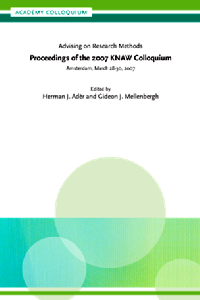Genre: Paper collection
Authors: Herman J. Adèr and Gideon. J. Mellenbergh
ISBN: 97-890-79418-03-9 (Softcover)
Price (at the Publisher): €7,50 ($ 8,50)
First Edition: 2008
eBook ISBN 97-890-79418-30-5
Price: €9,- ($ 10,25)
Website: www.jvank.nl/ARMProcs
Contents
Advising on research methods: Proceedings of the 2007 KNAW Colloquium edited by Herman Adèr and Gideon Mellenbergh contains a number of newly written articles based on lectures held at the 2007 KNAW colloquium.
The physical book is sold out. A few copies can be ordered at the Publisher’s. February 2014 an eBook version has become available.
An important part of the job of most methodologists is advising substantive researchers on research methods. Methodological consultancy impresses outsiders as an art, and methodologists sometimes reinforce this impression. However, useful information is available on both the communication and content aspects of methodological consultancy, and this knowledge can be passed on to starting methodological consultants.
The colloquium covered a broad spectrum of consultancy topics. Several speakers extended their contribution to a paper which is published in the present proceedings of the colloquium.
Advising on research methods in a multi-disciplinary setting is discussed by both Janice Derr and Hilde Tobi. Derr describes barriers to the effectiveness of statistical consultancy in multi-disciplinary settings, and practical ways to overcome them. Tobi takes Lattuca’s (2003) distinction between four types of interdisciplinarity as a starting point to describe the role of the methodological consultant in each of these four types. She also discusses the possibilities and challenges of working in interdisciplinary research settings.
Gerald van Belle links statistics to everyday experience. He considers statistics as a distillation of human experience of variation and causation. Statistical consultants can take advantage of this link by appealing to their clients’ experience of variation and causation. Victor van Daal comments on Van Belle’s views. He expands Van Belle’s topics of variation and causation by connecting them to De Groot’s phases of the empirical cycle of research.
The contributions of both Robert Pool and Jules Ellis are on methodological consultancy in practical setting. Pool describes a clinical trial on the prevention of HIV transmission in Africa. The exclusive use of conventional surveys and questionnaires is out of the question in this context. He describes pitfalls and solutions of getting information on the sensitive topic of this clinical trial. Ellis reports consultancy to companies, which did research on the financing of the health care in The Netherlands. He discusses the effectiveness of advice given the constraints of prior ideas and requirements of decision makers and stakeholders.
The contributions of Bo Lu and Marijtje van Duijn and of Herman Adèr are more theoretical than the other contributions. Lu and Van Duijn discuss the use of propensity scores to reduce selection bias in observational studies. They present a simulation study to illustrate that propensity score matching can be effective in reducing selection bias. Their contribution shows that the propensity score should be part of every consultant’s methodological toolbox. Adèr addresses two related topics. First, the importance of the temporal order of observations and events. Second, the application of research strategies, such as structural equation modelling and propensity score matching. The two topics are related because the application of a research strategy implies a temporal order of actions, which have to be taken. His contribution alerts consultants to the importance of temporal order and the application of ordered actions in a research strategy.
WebsiteOrder at the Publisher’s
Sample download: PrefaceeReaderiPad / iPhoneKindle
 1416total visits,2visits today
1416total visits,2visits today

